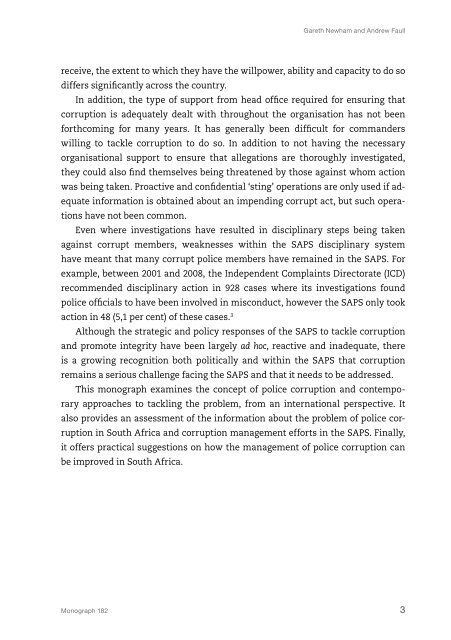Protector or predator? - Institute for Security Studies
Protector or predator? - Institute for Security Studies
Protector or predator? - Institute for Security Studies
Create successful ePaper yourself
Turn your PDF publications into a flip-book with our unique Google optimized e-Paper software.
Gareth Newham and Andrew Faull<br />
receive, the extent to which they have the willpower, ability and capacity to do so<br />
differs significantly across the country.<br />
In addition, the type of supp<strong>or</strong>t from head office required f<strong>or</strong> ensuring that<br />
c<strong>or</strong>ruption is adequately dealt with throughout the <strong>or</strong>ganisation has not been<br />
f<strong>or</strong>thcoming f<strong>or</strong> many years. It has generally been difficult f<strong>or</strong> commanders<br />
willing to tackle c<strong>or</strong>ruption to do so. In addition to not having the necessary<br />
<strong>or</strong>ganisational supp<strong>or</strong>t to ensure that allegations are th<strong>or</strong>oughly investigated,<br />
they could also find themselves being threatened by those against whom action<br />
was being taken. Proactive and confidential ‘sting’ operations are only used if adequate<br />
inf<strong>or</strong>mation is obtained about an impending c<strong>or</strong>rupt act, but such operations<br />
have not been common.<br />
Even where investigations have resulted in disciplinary steps being taken<br />
against c<strong>or</strong>rupt members, weaknesses within the SAPS disciplinary system<br />
have meant that many c<strong>or</strong>rupt police members have remained in the SAPS. F<strong>or</strong><br />
example, between 2001 and 2008, the Independent Complaints Direct<strong>or</strong>ate (ICD)<br />
recommended disciplinary action in 928 cases where its investigations found<br />
police officials to have been involved in misconduct, however the SAPS only took<br />
action in 48 (5,1 per cent) of these cases. 3<br />
Although the strategic and policy responses of the SAPS to tackle c<strong>or</strong>ruption<br />
and promote integrity have been largely ad hoc, reactive and inadequate, there<br />
is a growing recognition both politically and within the SAPS that c<strong>or</strong>ruption<br />
remains a serious challenge facing the SAPS and that it needs to be addressed.<br />
This monograph examines the concept of police c<strong>or</strong>ruption and contemp<strong>or</strong>ary<br />
approaches to tackling the problem, from an international perspective. It<br />
also provides an assessment of the inf<strong>or</strong>mation about the problem of police c<strong>or</strong>ruption<br />
in South Africa and c<strong>or</strong>ruption management eff<strong>or</strong>ts in the SAPS. Finally,<br />
it offers practical suggestions on how the management of police c<strong>or</strong>ruption can<br />
be improved in South Africa.<br />
Monograph 182 3

















